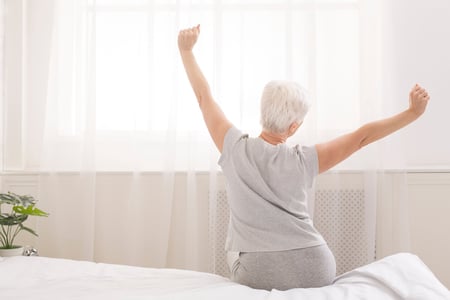
Everyone knows the feeling. You’re walking up a steep flight of stairs and feel your breathing get a little heavier than usual, or you’re running on the treadmill and feel a slight tightness in your chest. This is fairly typical—lungs don’t have unlimited capacity, and at a certain point of exerting them, you will run out of steam—and breath.
However, what happens when you get out of breath from walking up just a few steps instead of a flight of stairs, or when you get chest tightness from simply walking on the treadmill? Unfortunately, this can be typical too. After the age of 35, your lung capacity will gradually decline. While this is a normal part of aging, there are some steps you can take to protect and strengthen your lungs over time.
Brickmont Assisted Living, with senior living communities throughout the Atlanta area, aims to be a resource on senior health and wellness. We’re sharing some tips on how you can keep your lungs healthy and capable as you age.
Why Does Lung Health Decline?
Age
Much like other parts of your body, your lungs change with age. Certain changes, like a weakened diaphragm, narrower airways, and changes in rib cage structure, can result in a decline in lung capacity. These changes, however, should be subtle and gradual. You may notice only minor changes, like getting winded or out of breath more easily.
While it’s natural for lungs to lose capacity, certain factors can accelerate this decline.
Smoking
Smoking may be the single most damaging thing to your lung health. As the leading cause of lung cancer, cigarette smoking can narrow the airways, inflame the lungs, and damage lung tissue.
Occupation
In addition to age and tobacco use, certain occupations can cause lung damage, as well. Jobs that involve long-term exposure to hazardous chemicals or smoke—like construction, textile or factory work, auto work, and mining—can accelerate lung problems.
While you can’t completely prevent your lungs from reducing their efficiency, there are some habits you can implement to preserve your lungs’ function and even slow down their natural decline.
How to Improve Lung Health
Quit Smoking
Quitting smoking is undoubtedly the best way to better your lung health. Unfortunately, the damage that has already been done is permanent, but after quitting, lung function will increase over time, and the risk of infection and disease will decrease.
For help quitting, The American Lung Association has guides and resources.
Exercise
It shouldn’t come as a surprise that exercise is on the list of ways to improve lung health. Being physically active can increase your lungs’ strength and function—making the body more efficient at distributing oxygen throughout the bloodstream.
To get the most out of exercising, try to add some resistance training to your normal routine. This could be adding a few hills or some light weights to your regular walk.
Avoid Exposure to Indoor and Outdoor Pollutants
Natural and chemical pollutants can cause lung damage. Ensure that your home, workplace, or school is free of radon, mold, and other harmful pollutants. Even typical household attributes like dust or pet danger can irritate the lungs. Also, ensure that when you’re outside, you are breathing in clean air free from smoke or chemicals.
Stay Healthy
Respiratory infections and illnesses can damage lung health, especially for those who already have a condition, like COPD or asthma.
To protect yourself and your lungs against infection, it’s essential that you are taking steps to stay healthy, particularly during cold and flu season. Wash your hands often, avoid crowds, and get vaccinated for both the flu and pneumonia.
Take a Deep Breath
Without realizing it, most people take shallow breaths from their chest area, underutilizing the lungs. By breathing deeply and fully, you can clear the old air from the lungs and create a full oxygen exchange.
There are also several breathing exercises and techniques that can make your lungs more efficient over time. Some examples of breathing techniques include:
- Pursed Lip Breathing: Breathe in through your nose and breathe out for twice as long using pursed lips.
- Diaphragmatic Breathing: Place one hand on your stomach and the other on your chest. Breathe in through your nose and out through your mouth, making sure that your stomach, and not your chest, fills with air each time.
- Box Breathing: Breathe in through your nose while counting to four. Counting to four again, hold your breath. Finally, exhale while counting to four again. This method is also a great way to reduce stress and anxiety.
Catch Your Breath
While a decline in lung health and capacity is expected over time, a healthy and active lifestyle free of tobacco and pollutants can prolong and strengthen your lungs. If you notice any sudden changes in breathing abilities or unexpected chest pain or tightness, it’s best to consult with your physician. We hope these tips on how to improve lung health will help you breathe easy!
Brickmont Assisted Living has senior living communities throughout Atlanta, Georgia, dedicated to providing genuine service, authentic hospitality, and compassionate care.
For more information and resources on senior living, health, and Brickmont communities, visit our website!




.png)